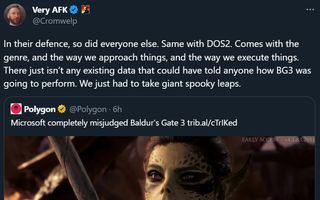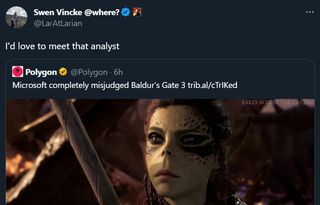Microsoft dismissed Baldur's Gate 3 as a 'second-run Stadia PC RPG' before it released—Larian doesn't blame them
A comment in a leaked Microsoft document reveals that the company heavily underestimated Larian's hit RPG.

After it launched, Baldur's Gate 3 hit a phenomenal 800,000 concurrent Steam players and received PC Gamer's highest review score in 16 years, but during its years in early access, it wasn't widely expected to be the next big thing. Take as an example this May 2022 document accidentally leaked by Microsoft as part of its lawsuit with the FTC which dismissed Baldur's Gate 3 as a "second-run Stadia PC RPG" that Microsoft figured it could get onto PC Game Pass for about $5 million.
You'd think Larian might be insulted by the lack of faith, but the truth is that the Baldur's Gate 3 developer didn't think its RPG would be this big of a deal either. Larian boss Swen Vincke is on record as worrying that Baldur's Gate 3 might have peaked in Early Access.

Larian's director of publishing, Michael Douse, said today in response to a Polygon article about the leaked comment that he wasn't surprised by Microsoft's expectations. "There just isn't any existing data that could have told anyone how BG3 was going to perform," he said.
Still, I'd argue that "second-run Stadia PC RPG" was never a very sensible prediction for a D&D sequel in the most storied series of D&D games, and one of the most beloved PC game series ever, released during the most famous and popular period in D&D's history. (Stadia, for the record, didn't even survive until Baldur's Gate 3's release.)
The assessment from inside Microsoft was part of a list of ideas for games to include in Xbox's Game Pass subscription. The high end of considerations on the same list had "low" chance to get games like EA's Jedi Survivor, which Microsoft figured it'd have to pay upwards of $300M for on the off chance EA said yes.
The impetus for the whole exchange was that Starfield had been pushed back, leaving a 16-month gap between marquee games on Xbox's services that boss Phil Spencer called a "disaster situation" at the time. Baldur's Gate 3 would later be scheduled to release at about the same time as Starfield before getting moved forward a month—ostensibly to avoid the bigger RPG release.
Which is pretty wild, with Baldur's Gate 3 getting far more universal acclaim from critics and players than Starfield ended up getting. Perhaps the only person in the world who was seeing things clearly was PC Gamer's Wes Fenlon, who wrote earlier this summer: "What if Baldur's Gate 3 isn't just getting out of Starfield's way by launching a month early—what if it's better?"
The biggest gaming news, reviews and hardware deals
Keep up to date with the most important stories and the best deals, as picked by the PC Gamer team.

Vincke, who was unsure how well BG3 would do himself, joked that he would like to talk to that Microsoft analyst. I'm sure they could swap stories of how badly both of them underestimated the RPG's success.
Lots of other internal Microsoft documents were revealed with these leaks, including a 2020 email from Xbox boss Phil Spencer in which he enthusiastically writes about the possibility of acquiring Nintendo—or maybe Valve—and plans for a new Xbox controller and Xbox Series X refresh.
Spencer addressed the leaks on X today: "We've seen the conversation around old emails and documents," he wrote. "It is hard to see our team's work shared in this way because so much has changed and there's so much to be excited about right now, and in the future. We will share the real plans when we are ready."
Jon Bolding is a games writer and critic with an extensive background in strategy games. When he's not on his PC, he can be found playing every tabletop game under the sun.
Most Popular




